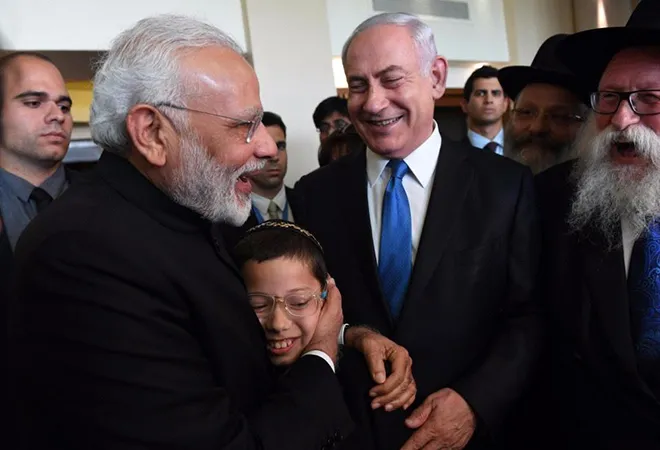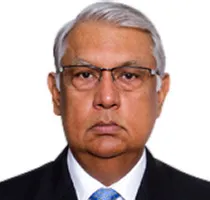The UPA government’s PM for a decade, Dr Manmohan Singh, could have visited Israel and entered the history books as the first Indian PM to step on to Israeli soil, He chose not to, even after the opportunity presented by the first ever visit of an Israeli PM, Ariel Sharon, in 2003. Manmohan Singh was, probably, held back by the fealty that the Congress Party and its left-wing allies owed to Nehruvian legacy. Though India had extended her recognition to Israel as an independent nation in 1950 when Jawaharlal Nehru was PM, he did not agree to establish full diplomatic ties with Israel. Ironically, it was a Congress Party PM, Narasimha Rao who gave the green signal to establish diplomatic relations with Israel in 1992.
It took PM Narendra Modi three years to break out of the straitjacket of this legacy, when he undertook the first ever visit by an Indian PM to Israel in July 2017. PM Modi, however, carefully balanced, his visit with earlier visits to Gulf countries and Iran, where India’s interests in its diaspora, energy supply, remittance, trade and investment are considerable. Modi also de-hyphenated the Israeli and Palestine by hosting the Palestinian President Mahmoud Abbas in Delhi and later visiting Israel thereafter. He is expected to visit Palestine next month, perhaps via Jordan, avoiding Israel. The BJP has always been a strong proponent of closer relations with Israel, while the Congress party has been hobbled by the hesitation of history.
Israel has doggedly pursued its courting of India over the years, particularly at times when India needed critical defence supplies during conflicts with Pakistan. Over the last 25 years the interface of bilateral ties has broadened into sensitive areas like high technology products, defence equipment, security, intelligence, agriculture, water management, pharmaceuticals, information technology etc. Joint production and development of key defence items has emerged as an important domain of cooperation. Israel is today the 3rd largest source of key defence equipment for India.
Under previous governments, India tried to keep these growing ties off the radar screen. Ties with Arab and Islamic countries were compelling reasons. Today, however, bilateral ties are no longer hostage to these ties. Ties with Israel have broad bipartisan support in Indian politics. Indian Muslims are more concerned about their own welfare and aspirations, rather than lose sleep over the Palestinian cause. Yet India maintained its consistent position by going with the majority in the UN vote on Jerusalem and will continue to reiterate its public support for the State of Palestine and exhorting both sides to negotiate a peaceful settlement, based on a two-State solution and secure borders.
Israeli PM Benjamin “Bibi” Netanyahu has returned the Modi visit in under 7 months. The Israeli media has speculated furiously that though Netanyahu’s position as Israel’s PM is not under immediate threat, he and his family members have been dogged by corruption scandals that might end his political career.
The Israeli media has speculated that his India visit was amuch-needed respite from mounting political trouble back home. This is perhaps, partially true but the fact remains that India’s public embrace of Israel has been made inevitable, as Gulf countries gravitate towards Israel is search of support against Iran. A West Asia, divided by regional rivalry, sectarian cleavage and civil wars in Iraq, Syria and Yemen facilitates India’s independent relations with different countries of West Asia. PM Modi and PM Netanyahu have the added advantage of having developed the personal chemistry to take bilateral ties forward.
Netanyahu’s visit pressed all the right buttons with the Israeli PM indulging in some selective rhetoric and hyperbole. He talked of an “India-Israel Alliance” which does not exist in India’s diplomatic vocabulary. The strong business contingent accompanying Netanyahu left no one in any doubt that the bedrock of this relationship is and will remain trade, investment, technology transfer, intelligence exchange, defence cooperation and co-production. Israel is a world leader in surveillance and sensor technologies and in this domain India has lot to gain by inducting such technologies into our security structures, particularly to fight Pakistani-sponsored terrorism.
Further expansion in bilateral ties is likely to take place in tourism, skill upgradation, water management technology with focus on productivity and reduction of water consumption in agriculture. Another crucial area is recycling of waste water. India rapid urbanization is creating huge challenges in our urban spaces for waste management. Cyber security and R&D cooperation has been included among MOU’s signed during the visit. There is, however, an absence of any heavy ticket agreement indicating that this visit was weighted towards optics. The also helps Netanyahu in signalling his own achievement as PM of Israel and buttresses his country’s “Look East” policy, at the core of which is the re-emergence of Asia as the economic powerhouse of the world.
This commentary originally appeared in Economic Times.
The views expressed above belong to the author(s). ORF research and analyses now available on Telegram! Click here to access our curated content — blogs, longforms and interviews.




 PREV
PREV


